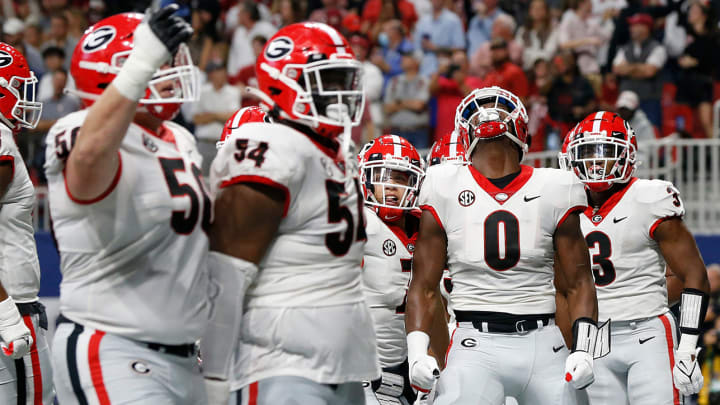For Georgia and Michigan, COVID-19 Protocols Are Just Another Part of Orange Bowl Prep

FORT LAUDERDALE, Fla. — Three days before Christmas, when Michigan was scheduled to arrive in South Florida to prepare for its Playoff semifinal tilt vs. Georgia, a press release went out signaling bowl week was going to be different. College Football Playoff organizers announced forfeit and cancellation policies, tweaked general media access and limited access to the playing field. The rules for the event lie somewhere between the assumed late-stage pandemic many thought we’d be in by now, and last year’s 20% capacity, heavily bubbled Orange Bowl and national championship game (both hosted in Miami’s Hard Rock Stadium).
“We’re just bridging through some of the frameworks that were in place in January 2021 to what we’re doing in December 2021,” Orange Bowl CEO Eric Poms told Sports Illustrated. “Going through the fall, there was a sense of optimism that things were getting better with regard to COVID-19, but we didn’t expect that there would be the rise that there was across the country and across the world [of the omicron variant]. Because of our experience in January 2021, we could draw on that.”
Much of the jurisdiction of the event, especially regarding health and safety protocols, lies with the CFP management committee, which is why tweaks in the lead-up to the Orange and Cotton Bowl semifinals are largely the same, like no in-person interviews and severely limiting who can be on the field before and after the game.
Much of the committee’s strategy focused on keeping as many people as possible away from players and coaches while still trying to preserve bowl-week activities. Including two doctors who provide guidance, the Orange Bowl committee has 380 members who typically mingle with the teams at various events. That has all been scaled back. Practice access, for instance, which initially remained open, was closed 30 minutes before team shuttles were scheduled to depart.
Despite these changes, the Orange Bowl is sold out with a full capacity crowd expected.
Last season, the four teams that played postseason games in South Florida were here for three days each. This time around both teams will spend nearly a week. One of the things the bowl has kept in mind is that one of these teams will have another game to play.
“One of the big differences this year is the winner of this game is moving on to the national championship game,” Poms said. “We’re very mindful, we’re very sensitive to that. Our committee and our staff and our volunteers are under strict restrictions with regard to what we’re gonna do to make sure we give them a great experience but at the same token, safe and comfortable.”
Poms said vaccinations are obviously the biggest difference this go-around. Michigan reportedly got its booster shots as a team Dec. 22, as did Georgia. There have been rumors of multiple Georgia players testing positive. Key wide receiver George Pickens and backup quarterback JT Daniels were among those who arrived separate from the rest of the team, after clearing COVID-19 protocols.
As for other players, both in North Texas for the Cotton Bowl and here in South Florida, keeping safe in part involves not doing much of anything. Georgia tight end John Fitzpatrick noted that besides a dinner cruise the night they arrived, the team hasn’t really done anything besides practice and hang out at the hotel. Alabama’s Bryce Young said key Tide players made a decision to keep things under wraps as well.
“As a leadership group, we had to make a decision that we weren’t going to go anywhere, we weren’t going to leave the hotel,” Young said. “We were going to stay in the hotel to make sure that we could try to do our best to try to cancel out and eliminate any COVID possibilities. Obviously, we can only do that part. But as a group, as a leadership group and a team, we all came together. And I'm sad we weren’t going to leave the hotel room. We’re going to practice, and we’re staying in there. We understand the realities of COVID and the modern world we live. That was the decision we all made. And it’s a sacrifice. But at the end of the day, that’s what we have to do to put ourselves in the best position.”
More College Football Coverage:

Richard Johnson is known for his college sports expertise. He co-hosts the “Split Zone Duo” podcast and co-authored The Sinful Seven: Sci-fi Western Legends of the NCAA. Richard was the 2022 winner of the Edward Aschoff Rising Star Award, and previously appeared as an analyst on the SEC Network show “Thinking Out Loud.” He established an early career with ESPN and SB Nation before joining Sports Illustrated in 2021 and lives in Brooklyn.
Follow RJ_cfb